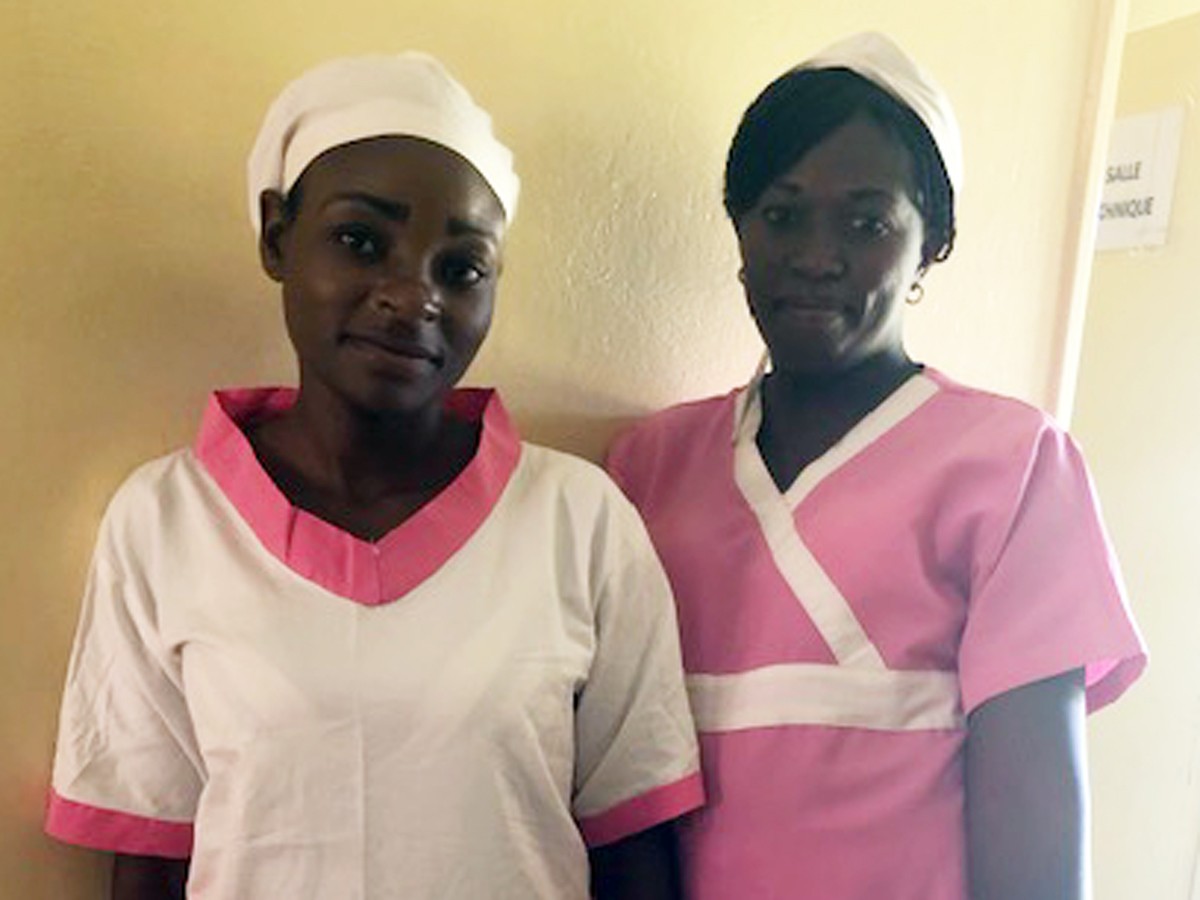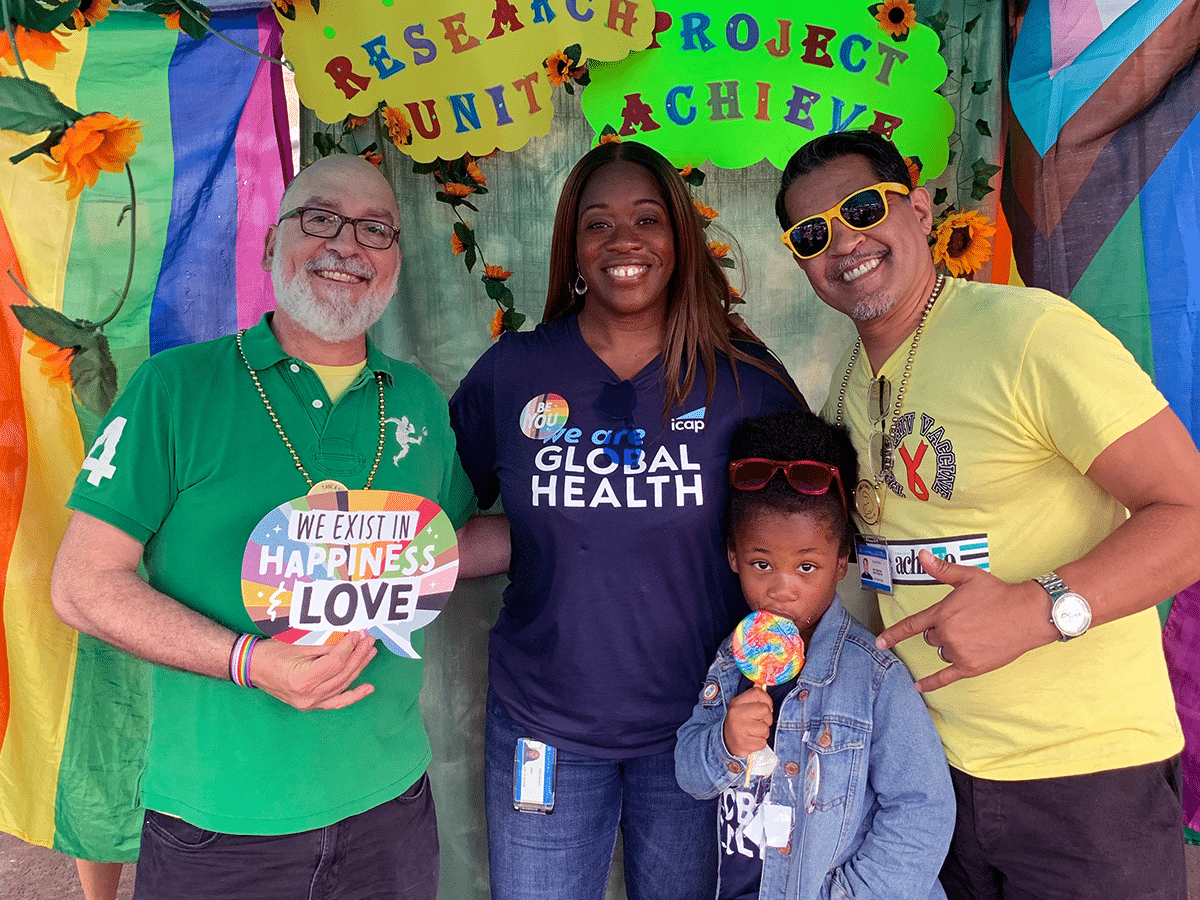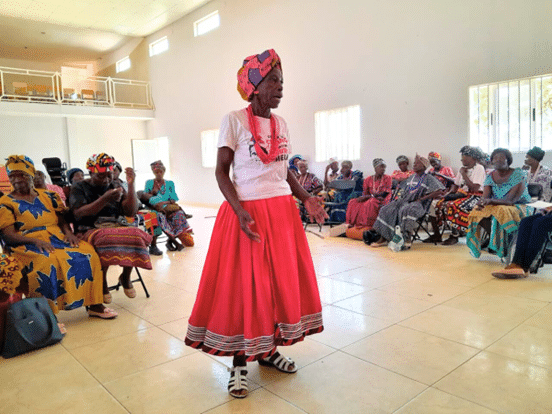In honor of the Year of the Nurse and the Midwife, ICAP is exploring the leadership roles nurses play in delivering care, shaping health policy, and contributing to rising health indicators in communities around the globe. As the largest health workforce working in clinics, hospitals, and schools, nurses are the frontline heroes of public health
In this Q&A with teachers and students from the ICAP-supported ITM Immaculé Lubumbashi School of Nursing and Midwifery in DRC, we learn about what inspired these current and future professionals to address the health needs of their communities.
They also share their thoughts on their school’s participation in rural rotational internships, as part of the Resilient & Responsive Health Systems (RRHS) initiative, funded by U.S. Department of Health and Human Services through the Health Services and Resources Administration (HRSA).
Erick Mbala is the preceptor and midwifery section chief of the ITM Immaculé Lubumbashi School of Nursing and Midwifery
Fifi Kaj is the head of the ITM Immaculé Lubumbashi School of Nursing and Midwifery
Q: How did you get started in public health and nursing?
EM: My father was a nurse and took good care of our family’s health so I became a nurse to take care of the health of the community at large and the wider population.
FK: When I was 16, I was hospitalized. In the ICU, I was treated very well. I really appreciated the way in which the health providers worked. This motivated me to do the same for others.
Q: So, what motivated you to work in nursing education?
EM: I wanted to share my professional experience not only with the community, but with the younger generation as well.
FK: Many Congolese people die because of the poor quality of health care. That is what motivated me. I want to teach to ensure a qualified workforce that is capable of providing quality services.
Q: What inspires you about the faculty and students at your nursing school?
EM: Students have the opportunity to practice widely in the rural areas as well as treat persons living with HIV, who have limited access to care. Also, the up-to-date knowledge in HIV for teachers, and access to the latest scientific research in the library.
FK: Students loved being in rural areas and the faculty has adjusted well to the academic reform in the nursing/midwifery curriculum.
Q: How do you see the faculty and students making a difference in the community?
EM: Faculty members accompany and assist students in their adopted communities as they sensitize them in HIV. The communities have been more receptive of students in this sense.
FK: The community internship has been very well received and the population is now very sensitized.
Thirty-three nursing and midwifery students participated in the first batch of rural rotations in DRC, three of them share their experiences on strengthening health care service delivery to at-risk populations located in remote, underserved areas.
Evodie Sakisa Tshilombo and Asnath Kabika Tabu are third-year nursing students at the ITM Immaculé Lubumbashi School of Nursing and Midwifery.
Elysee Mukala Banza is a second-year midwifery student at the same school.
Q: What motivated you to go to nursing school?
EST: While visiting the sick, I was impressed with how they were cared for and I wanted to do the same for other people.
AKT: I was often sick in my childhood and was looked after very well in the hospital. Then, when I played, I would organize games where I pretended to be a nurse based on what I observed at the hospital. I developed a strong interest in pursuing nursing as a profession to help others heal because of this experience.
EMB: When I was 12, my maternal aunt died during childbirth and I decided to join midwifery school to improve the health of the population.
Q: What are the most valuable things you’ve learned so far, both in the classroom and in your rural clinical rotation?
EST: Having good manners and a good attitude towards sick people. I have also learned to recognize clinical symptoms of HIV as well as strategies for addressing stigma and discrimination against people living with HIV.
AKT: I have learned how to test for HIV and confirm results as well as provide post-test counseling.
EMB: How to offer prevention of mother-to-child services.
Q: What were you most excited about or afraid of in doing a rural clinical rotation?
EST: I worked without stress in the rural areas, as I was not subjected to ridicule and disrespect from practicing nurses and midwives for my lack of practical experience. I had many opportunities to put my theoretical knowledge into practice, which has motivated me to contribute my knowledge and skills to addressing the challenges faced by patients in this high prevalence area.
AKT: I was most excited about how considerate the professional nurses were of the patients and students. I saw a case of congenital syphilis in a six-month-old child. I’m afraid of the fact that patients prefer to consult traditional healers and end up coming to health facilities with many wounds, which can be a source of HIV infection.
EMB: I was given the opportunity to practice and direct deliveries. I was surprised by adolescent pregnancies in rural areas among girls between 14 to 17 years. =
Q: What is the most valuable takeaway/lesson from your rural clinical rotation that will help you in your future work?
EST: Rural areas are livable and acceptable locations. I would strongly consider working there.
AKT: I initially had a bad impression of the rural area; the environment did not seem very appealing, I didn’t think there were any hospitals. However, I have developed an interest in going to work.
EMB: I would consider working in rural areas. I would like to return there to strengthen my clinical knowledge.
Q: What do you feel you were able to experience or accomplish in a rural setting that you would not have been able to in an urban setting?
EST: I had limited opportunities to conduct counseling in urban areas as we are cast aside by practicing in-service nurses.
AKT: There were limited opportunities for counseling and testing of persons living with HIV in urban areas. We were encouraged to provide this service in the rural areas.
EMB: I managed six deliveries for one month after first observing a few, giving me the opportunity to practice. I also worked in HIV service delivery at the antenatal care department.
ICAP will continue to support rural rotations for students. As described above by faculty and students, rural rotations offer many opportunities that may not be afforded in urban areas where practicing nurses are very busy and limited in their time to mentor students. Exposure to rural practice is also an effective way to increase understanding of rural communities’ health needs and create interest in rural health care, where trained health providers are few. Access to health care in rural areas has been a long-standing challenge, the HRSA-supported rural rotation program is addressing this rural practical training of the next generation of nurses.
This article is part of ICAP’s 2020 Year of the Nurse campaign to advocate for nurses as leaders in the international health sector and encourage discussion on how the global health world can better leverage nurses’ unique connections to the communities they serve.
With nurses at the helm advocating for patient-centered approaches in health care and health policy, practical and affordable solutions for the world’s most pressing health challenges are reachable.
Learn more about our work with, and for, nurses on our campaign page, #ThisNurseCan.
—-
A global health leader since 2003, ICAP was founded at Columbia University with one overarching goal: to improve the health of families and communities. Together with its partners—ministries of health, large multilaterals, health care providers, and patients—ICAP strives for a world where health is available to all. To date, ICAP has addressed major public health challenges and the needs of local health systems through 6,000 sites across more than 30 countries.
ICAP is celebrating 2020 as the Year of the Nurse and Midwife. Learn more here.








